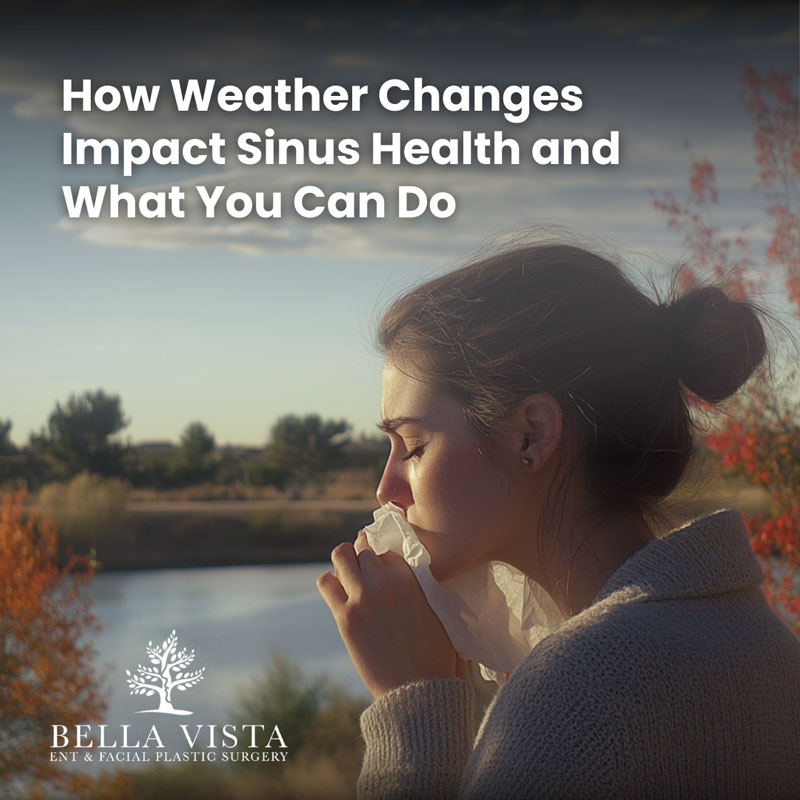How Weather Changes Impact Sinus Health and What You Can Do

Have you ever noticed that your sinuses seem to act up more when the weather changes? For many people, shifts in temperature, humidity, and air pressure can make sinus symptoms worse. From congestion to headaches, changes in the weather can put a lot of pressure—literally—on your sinuses. Knowing why this happens and knowing how to reduce discomfort can help you keep sinus problems under control.
Here’s a closer look at why weather affects sinus health and what you can do to feel better.
How Weather Affects Your Sinuses
Sinuses are air-filled spaces behind your forehead, nose, and cheeks, and they’re sensitive to changes in the environment. When the weather shifts, it can trigger a range of sinus issues, often making existing problems worse. Here are the main ways weather can impact your sinuses:
- Humidity Levels: Both high and low humidity can affect your sinuses. When the air is dry, such as in winter or during a hot, dry summer, your nasal passages can become dried out and irritated. Low humidity can cause your mucus to thicken, making it harder to drain. On the other hand, high humidity creates the perfect environment for mold and dust mites, which are common allergy triggers. High moisture can also make you feel congested, as your sinuses may swell in response to the damp air.
- Air Pressure Changes: Shifts in barometric pressure, such as during storms, can cause pressure changes inside your sinuses, leading to headaches and congestion. Some people are especially sensitive to air pressure changes, experiencing sinus pain or pressure when a weather front moves in.
- Temperature Fluctuations: Moving between extreme temperatures, like stepping from a warm house into cold air, can irritate your nasal passages. Cold air can dry out your nose, while sudden changes in temperature can make it harder for your sinuses to drain.
- Wind and Seasonal Allergens: Windy days can stir up pollen, mold, and other allergens, which then enter the nasal passages and can worsen sinus symptoms. Seasonal allergens, especially in spring and fall, can also cause sinus swelling, which leads to discomfort and congestion.
What You Can Do to Ease Sinus Symptoms
If weather changes are affecting your sinuses, a few proactive steps can help relieve discomfort and keep symptoms under control:
- Use a Humidifier or Dehumidifier – If the air in your home is too dry, using a humidifier can add moisture and help prevent dryness in your nasal passages. Keep humidity levels between 30-50%. In damp conditions, a dehumidifier can help by reducing excess moisture that encourages allergens.
- Stay Hydrated – Drinking plenty of water helps thin mucus, making it easier for your sinuses to drain. Aim to stay hydrated throughout the day, especially in cold or dry weather.
- Flush Your Sinuses with Saline Rinse – Saline rinses can help clear out allergens and thin mucus, reducing pressure and keeping your nasal passages moist. You can use a saline spray or try a neti pot for a deeper rinse.
- Avoid Sudden Temperature Changes – Try to limit exposure to extreme temperature shifts by dressing appropriately for the weather and avoiding sudden moves from hot to cold environments. If you’re prone to sinus issues in cold weather, wearing a scarf over your nose and mouth can help warm and humidify the air before it enters your nasal passages.
- Consider Allergy Medications – If seasonal allergies are worsening your sinus symptoms, over-the-counter antihistamines or nasal sprays may help reduce inflammation. Talk to a healthcare provider if you’re unsure about which options might work best for you.
- Monitor the Weather – Keeping an eye on weather forecasts, especially for changes in air pressure and humidity, can help you prepare. Many weather apps offer daily updates on allergens, air quality, and more, so you can take extra steps on high-risk days.
Take Control of Sinus Pain Before It Hits
Weather changes may be out of your control, but managing their impact on your sinuses is possible with a few smart strategies. By keeping an eye on humidity, using sinus-friendly tools like humidifiers and saline rinses, and being aware of allergy triggers, you can lessen discomfort and enjoy each season with fewer sinus headaches and less congestion. So, as the weather shifts, remember to keep these tips in mind, and let sinus discomfort stay out in the cold!


